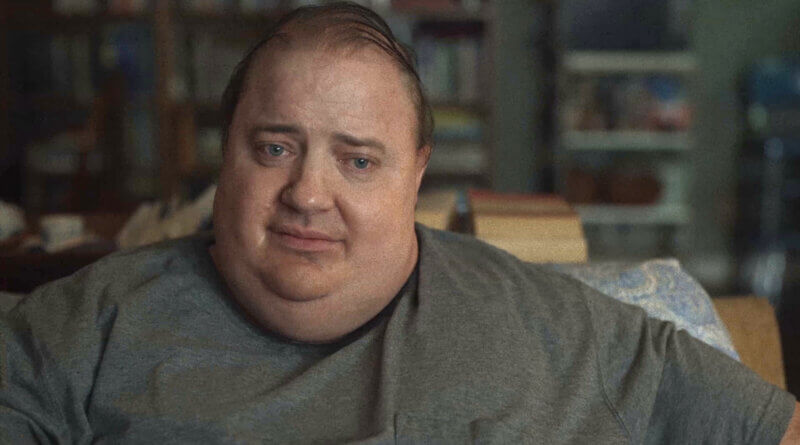The Whale (2022), Darren Aronofsky’s Worst Film to Date
I fail to see the logic in Darren Aronofsky’s filmography. He started off his career brilliantly with Pi (1998), a micro-budget film on the destructive power of obsession and the limitations of human knowledge. He followed this masterpiece with one of the greatest drug films of all time, Requiem For a Dream (2000). After a six-year hiatus, Aronofsky returned with The Fountain (2006), The Wrestler (2008), and Black Swan (2010). Then, inexplicably, he signed on to create Noah (2014), a financially successful but dreadfully shallow biblical action movie. Fortunately, he returned to form with the cryptic and beautifully surreal Mother! (2017). Sadly, this brings us to his latest creation, and one of the worst films I’ve seen from an otherwise great director: The Whale (2022).
Every director is going to have misfires, so one can forgive Aronosfky for Noah. After all, it did make a lot of money, and many artists sign onto bad mainstream endeavors to help fund their own passion projects. However, The Whale is not an action-packed blockbuster like Noah or a beautiful art film like Pi, packed with ideas and raw authenticity like many of his previous works. Instead, it is the very thing that the film’s hero (or antihero), rants against — amateur, inauthentic nonsense.
Before I discuss the film itself, it’s important to address many of the critiques surrounding Darren Aronofsky’s portrayal of a morbidly obese man during the last days of his life. Did I think the film tried to shame fat people? Yes and no. On the one hand, it uses grim, green, horror-movie lighting to make Charlie (Brendan Fraser) appear grotesque at all times. Viewers are also bombarded with dramatic music and gross-out sound effects whenever Charlie is mindlessly stuffing food into his mouth.
So yes, it does its fair share of fat-shaming. However, Aronofsky is trying to show the life of a man who doesn’t actually want to live anymore. He’s actively trying to kill himself, or at least give up on the idea of living a happy, fruitful life, and he just happens to take the route of morbid obesity. That said, the way in which the film portrays obesity and depression is obscenely amateur. Few people react to stressful situations by angrily stuffing two pieces of pizza into their mouth at once, yet that actually happens in what is meant to be the emotional climax. In any case, I have little else to say on the matter of fat shaming, as I think it is actually the least of the film’s problems.
The Whale opens with Charlie masturbating to gay porn in his dark and dreary apartment. Before he even has time to finish, he seems to suffer from a heart attack, just when a young Bible-thumper, Thomas (Ty Simpkins), comes knocking on the door to convert Charlie to a Christian cult called “New Life.” Charlie asks the boy for help contacting his friend and unofficial caretaker, Liz (Hong Chau). Liz comes, rudely tells Thomas to leave, and informs Charlie that he will die if he doesn’t get to a hospital. Charlie claims he can’t afford it, and therefore Charlie accepts his fate.

Charlie teaches college writing classes online, but he keeps his camera turned off so that his students will never see him. Obsessed with the concept of authenticity in writing, Charlie pours over an old essay about Moby Dick. This inspires him to reach out to his daughter, Ellie (Sadie Sink) whom he abandoned eight years prior. Ellie is rebellious and antagonistic toward Charlie. Nonetheless, Charlie offers to pay Ellie a large sum to give him the privilege of helping her with her homework. As Charlie attempts to grow closer to his daughter, revelations about his past life and the events that led up to his current state come to light.
Right from the opening shot, The Whale feels like a theater production transposed onto film. The setting never leaves Charle’s depressing apartment, so we only see things that happen inside or just outside the front door. The film actually would have been far more interesting and effective if it had leaned into the isolated setting even more, simply showing Charlie’s day-to-day activities without trying to add extra meaning to every little thing. Yes, we see Charlie struggle to take a shower, struggle to use his walker, struggle to get into bed, and struggle to avoid seeing people, but all of these moments are trampled by sophomoric acting and abysmal writing. The Whale is closer to a Lifetime made-for-TV movie than an actual film from a respected director that people should pay to see.
A lot of my disappointment with The Whale stems from the incessant need to beat viewers over the head with the message. Just to give a little context, it is a film called The Whale about a morbidly obese man (amazing), who is obsessed with an essay about Moby Dick (get it?), which is a story about a man obsessed with killing a whale (are you starting to see it?), and the morbidly obese man is hell-bent on killing himself with food (let me know if you’re still missing it). To make matters worse, Charlie wants his writing students to write authentically and stop trying to put on airs in their writing. I just wish Charlie had been able to talk to his own creator and screenwriter, Samuel D. Hunter, to teach him about authenticity and realism before releasing this garbage.
The Whale is only made worse by the very contrived revelations that seem to happen every five minutes. I won’t spoil the film for you, but just know that you’ll be able to predict half of the plot twists from a mile away. Even if you don’t see them coming, you’ll roll your eyes when they do arrive. The whole thing reads like a bad poem conceived by an angsty teenager (something that also happens in the film). As I write this review, it’s still hard for me to believe that the same person who brought us brilliant films like Requiem For a Dream and Black Swan could also shoot out this drivel under the guise of a moody, low-budget art film.
Before I forget, I don’t understand why Brendan Fraser, or anyone from the cast for that matter, has received so much praise for their performances. I actually like Brendan Fraser and think he deserves to make a strong comeback, but this is not it. He fumbles around in a very unrealistic fat suit and cries once or twice. That’s about it. He doesn’t feel believable or real in any sense. Despite how mediocre it is, he still gives the best performance in the film, so I guess that’s something.
Is The Whale a good movie? Absolutely not. Could it have been a good movie? Yes — no doubt in my mind. It had the talent behind it to go somewhere, but it’s a conceptual playground. Rather than diving into interesting philosophical waters, like whether life is worth living when you’re miserable and have little time left anyway, it just becomes a weird carnival about obesity and cliched family drama. If I could leave you with one piece of advice, it’s this: don’t pay to see The Whale. And if you do want to watch it when it inevitably lands on streaming platforms, don’t expect to come out feeling anything but contempt for the people who made it.
The Whale Movie Rating: ★ out of 5
If you’d still like to watch The Whale (2022), the film is currently available on Amazon. For more film reviews like this one, be sure to check out the Philosophy in Film homepage!

